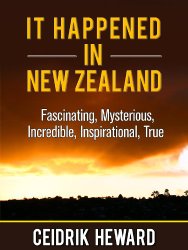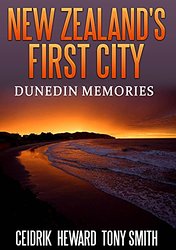Wanganui farmer, Walter Bolton was born in 1888 and grew up in the village of Mangamahu close to Wanganui. In 1913, he married local girl Beatrice Mabel Jones. They lived the usual life of a farming family at that time but unfortunately Beatrice died in July 1956 after a long and debilitating illness. An autopsy found traces of arsenic in her body, and a police investigation was launched. Further tests found small amounts of arsenic in Beatrice’s tea and the police decided that the amount she drank over the previous year was enough to kill her. Officials suspected foul play and tested water on the Bolton’s farm. They found the water contained arsenic, and traces of the poison was also found in Walter and one of his daughters. However, in the year before Beatrice’s death, it was discovered that Walter had paid for his wife’s expensive medical care, which seemed inconsistent with a systematic attempt to poison her. Beatrice’s sister, Florence Doherty, who often cared for Beatrice was initially suspected of her murder.

The case went to court and the defence argued that sheep dip had inadvertently got into the farm’s water supply. The prosecution’s case was strengthened when Walter admitted to having had an affair with Florence and the idea that Beatrice’s death was a result of accidental poisoning lost credibility. After deliberating for two hours and ten minutes, the jury returned a guilty verdict. When the judge asked Walter if there was any reason he shouldn’t pronounce the death sentence, the doomed man simply said ‘I plead not guilty, sir.‘
LAST HANGING IN NEW ZEALAND
In 1841 Maketu Wharetotara was the first person to be hanged in New Zealand after he murdered five people in European settler Elizabeth Roberton’s Bay of Islands household, where he was working. 116 years later, Walter Bolton, at the age of 68, was the last person to be executed in New Zealand when he was hanged at Mount Eden prison on February 18th 1957. The execution raised the frequently asked questions about the death penalty. A growing number of people believed that capital punishment was legalised murder and that it was morally wrong to take another person’s life. Others opposed capital punishment on religious grounds and many believed that it was too easy for mistakes to be made.
BOTCHED ENDING
After the hanging a newspaper story reported the execution had gone horribly wrong. Rather than having his neck broken the instant the trapdoor opened, the unfortunate prisoner slowly strangled to death. This highlighted another concern of those Kiwis who wanted an end to the death penalty. They claimed that executions were cruel and inhumane and there are some who still claim that Walter Bolton was an innocent man. Florence Doherty took her own life a year after Bolton was executed. Was she the guilty one?
The death penalty for murder was abolished in New Zealand in 1961, and it is believed that this was due partly to the circumstances surrounding the case of Walter Bolton.
KIWI SOULDER WHO FACED THE FIRING SQUAD
On 28 February 1945, Lance-Corporal David Russell of the Second New Zealand Division, 22nd Battalion was executed at Ponte di Piave, Italy. Due to his bravery in the face of certain death, he was awarded the George Cross making him the first member of a New Zealand military force to receive the medal.
As a young man, Scottish born David moved to New Zealand in search of a new life and in 1938, he took a job as an orderly at Napier Hospital. When war broke out, he joined the NZ Army and fought in Greece and Crete before he was wounded and captured by German forces on the 14th of July 1942 at Ruweisat Ridge in Egypt. He spent over a year in an Italian work camp before making his escape after Italy’s surrender in 1943. Instead of seeking safety via Yugoslavia the brave soldier chose to stay underground and assist other escaped prisoners. He joined a local partisan group and was often seen on a bike as he moved around northern Italy keeping in touch with other escaped allied soldiers.
After more than a year on the run he and the Italian farmer who gave him sanctuary, Giuseppe Vettorello, were arrested by a patrol of Italian Fascist troops on the 22nd February 1945. Transferred to the German forces Company Headquarters, the young soldier was chained to a wall in a stable and for three days, he was savagely beaten. The Germans told him that he would be shot unless he gave information about Vettorello and other ex-prisoners. He refused. When a sympathetic civilian tried to persuade him to save his own life David told him defiantly, ‘Let them shoot me’.

On the 28 February 1945, at Ponte di Piave, just a matter of a few weeks before the war in Europe ended, David was taken from the stable where he had been tortured and forced to stand before a concrete wall. He was asked if he had anything to say but said nothing apart from a request for a cigarette. He inhaled deeply. Throwing the cigarette aside, he stood to rigid attention facing the firing squad and died with his head held high. A German officer who witnessed the execution noted that Lance Corporal Russell died very bravely! His body was left where it fell, until the evening when it was wrapped in an Italian ground-sheet and taken by bullock cart to the local cemetery.
The young soldier was buried with great respect by the local people. They chose a grave that was the first on the right inside the main gate, the place of honour. Later the Commonwealth War Graves Commission, against the wishes of the local people, removed David Russell’s remains to the Udine Commonwealth War Cemetery.
On the 26th July 1949, to reward David’s gallant war efforts, King George VI presented the George Cross to David’s father. On his personal military file is the following comment: “There can be no doubt whatsoever that Lance Corporal Russell in the midst of his enemies and in the face of death, bore himself with courage and dignity of a very high order.” In that same year Napier Hospital opened the David Russell Memorial Ward in his honour and his hospital colleagues installed a plaque in a corridor.
The George Cross was retained by the Russell family in Scotland for almost 50 years but in 1998 they handed it over to the NZ Army Museum at Waiouru for safe keeping.
On the 50th anniversary of his execution a permanent David Russell memorial was erected over the original village gravesite in Italy. It presents his brave actions in both English and Italian. His sacrifice is well known to the present-day generation of Ponte di Piave and the gravesite is never without fresh flowers. It is a shame that he is virtually unknown of in New Zealand. There is a memorial to him on the wall of the Katikati RSA clubroom and a plaque in the Memorial Chapel at Hastings Hospital. Apart from these two modest memorials, David Russell’s name and bravery have faded into forgotten New Zealand history.
Ceidrik Heward
Ceidrik Heward is an Amazon TOP SELLING AUTHOR and has lived and worked in 7 countries working as a TV cameraman, director and film tutor. For the past 17 years he has focused on writing and has been published in magazines and newspapers in Europe, USA, Asia and the Middle East.
His interests include photography, psychology and metaphysics. He loves to read and always has at least 3 books on the go. He has written 22 manuals/books and has just completed his 4th short novel. Ceidrik believes sharing information and stories is the best way to stimulate the imagination and enrich our lives.



















 Visit Today : 344
Visit Today : 344 Total Visit : 1133521
Total Visit : 1133521
Speak Your Mind